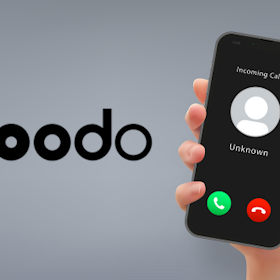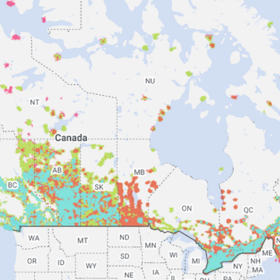
Article Summary
The short answer is that 5G wireless signals are safe for humans. The slightly longer answer is that it's possible that there is a link between wireless signals and cancer, but the scientific consensus is that there is no clear connection. We detail the science behind the studies below.
5G has started rolling out in Canada on the Rogers, Bell, and Telus cellular networks. However, it will be another few years before new features like "mmWave" are added to the collection of signals all around us. In the meantime, there are a lot of questions about how safe these new technologies really are.
There's no shortage of scientific research on the effects of wireless technology. Cellular signals, WiFi, 2G, 3G, 4G, Bluetooth, television and radio broadcasts, and microwave ovens have all been studied for their effect on biological organisms. The scientific consensus is that wireless technology causing cancer is "possible." But "possible" is not "probable," and it is far from "confirmed."
Many people who conduct their own research using anecdotal stories and cherry-picking studies may find that wireless communications has an absolute correlation with health issues. So how do you find the real truth?
You should first understand that
WhistleOut is an independent company.
WhistleOut Canada's mission is to provide the public with complete and accurate information about the overwhelming world of wireless communications. Mobile carriers advertise on our site, but our aim is to provide consumers with unbiased and clear information to help you pick the best device and plan for your needs. If you want to know more about how WhistleOut Canada operates, read How We Work and contact us if you want more information.
Is 5G Safe?
In 2011, the International Agency for Research on Cancer (IARC) published a comprehensive study summarizing scientific research into finding if there is a negative effect on human health caused by radio waves from cell towers, television broadcasts, and wireless networks.
The scientific consensus was that wireless broadcasts within the current limits set by government are safe to humans. However, the study also concluded that there is a "possible" link between wireless communications and cancer in humans.
Wait, a "Possible" Link?
Science has a reputation of being able to explain things with absolute certainty, but that's just not true. Science relies on hypothesis, experimentation, and reproducible results. It's through repeated experiments that a "scientific consensus" is achieved.
If you watch a lot of courtroom dramas, you'll hear "beyond a reasonable doubt." It is a term used to explain what can be assumed to be the truth. It doesn't eliminate the possibility of being wrong, but the verdict is the most likely a conclusion given the information at hand.
Think of "scientific consensus" as "beyond a reasonable doubt." It's possible that radio waves have a negative effect on human health, but there's overwhelming evidence through multiple scientific studies that what we experience every day is indeed within safe limits. More studies are happening all the time to challenge this consensus.
Some websites make the argument that radio signals are dangerous. These blogs often cherry-pick a few scientific papers illustrating the negative effects of wireless technology.
Coronavirus and 5G in Canada
In early 2020, Rogers Wireless launched their 5G network. Shortly afterwards, the COVID-19 pandemic reached Canada. Naturally, some made a connection between the two—that 5G caused the spread of the pandemic. Similar connections have been made between 5G technology and the coronavirus spread in the Chinese city of Wuhan. Canada, China and many other places around the world launched 5G on mid-band frequencies. Newer low-band and high-band (mmWave) broadcasts are still in testing for many markets. In short, 5G broadcasts today are just as safe as the 4G-LTE broadcasts from last year.
There's no scientific consensus
that connects 5G and the COVID-19 pandemic.
Beware the scammers; many of those who are ringing the alarms are often trying to sell you solutions. Many comments online (including some the bottom of this page) warn about 5G, and then link to sites that sell holistic solutions with no scientific merit.
Correlation Does Not Imply Causation
As humans, we're hardwired to recognize patterns. However, one or two examples does not make a reproducible scientific consensus.
Trust, but verify.
The trouble is in the next step. You must go out and find all relevant scientific material on the topic. Don't just look for the studies that agree with your hypothesis; that's not science. Science reaches a conclusion based on all the facts.
While researching this topic, we've found many pages that reference "studies" that find a link between wireless technology and health problems but then don't actually link to the studies. Just like Wikipedia, citation is needed or else it cannot be considered anything more than hearsay.
Other sites I've found do reference legitimate, published scientific papers. Many times these papers:
- Test frequencies different to those used in telecommunications
- Use high wattage broadcasts in a lab far beyond those allowed in public
- Some studies that produced positive results in finding a connection, but results could not be reproduced
There are also studies we found which did cast doubt and merit further research. That's where Scientific Consensus takes over.
Verdict: Is 5G Safe or Dangerous?
5G in Canada uses the same frequencies previously used with 4G broadcasts. High-frequency and low-frequency 5G won't be widely deployed until at least 2021, so there cellular signals are just as safe today as they have ever been.
The scientific consensus on current wireless communications is that they operate within safe levels. As 5G rolls out in Canada over the next few years, studies have shown that there is significant evidence to support that there will be no negative effect on people's health from those technologies either.
Keep an eye on this page and we'll update it regularly
with new information about 5G in Canada.
More Information on 5G
If you want to know more, we've answered a lot of the most common questions in our larger 5G Canada Guide. Bell, Telus and Rogers offer 5G coverage across Canada including Vancouver, Edmonton, Calgary, Toronto, Ottawa and Montreal, and Videotron offers 5G service in Quebec. There are also applications for home use and getting high-speed broadband internet to rural and difficult to reach locations. Our Canadian 5G Coverage article is updated regularly to show you where 5G can be found.
What are your thoughts on the safety of 5G and wireless communications? Let us know in the comments below.
Related Articles
Find Better Phones and Plans
Hundreds of cell phone plans unpacked. All the facts. No surprises.



































